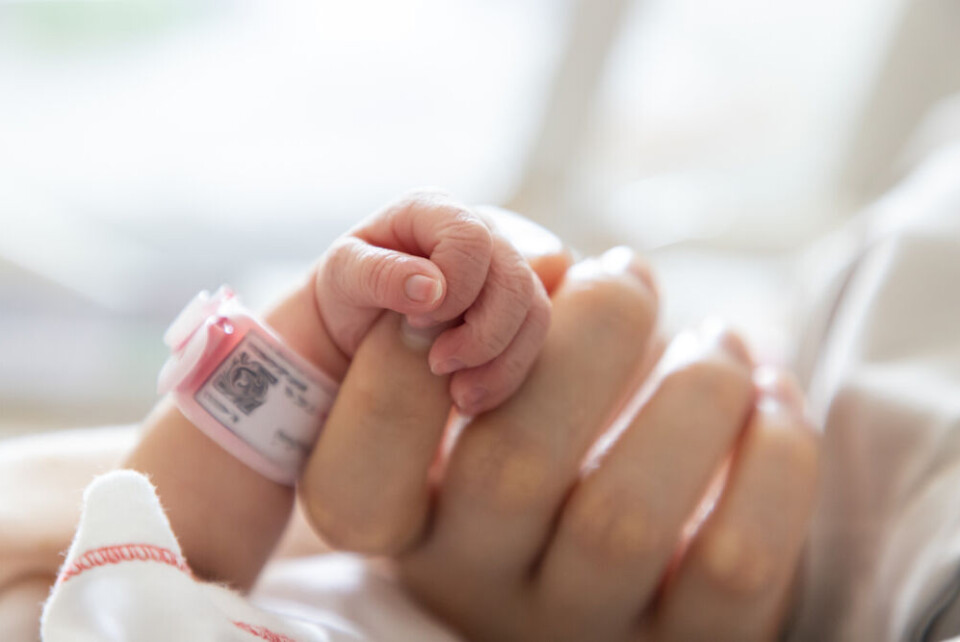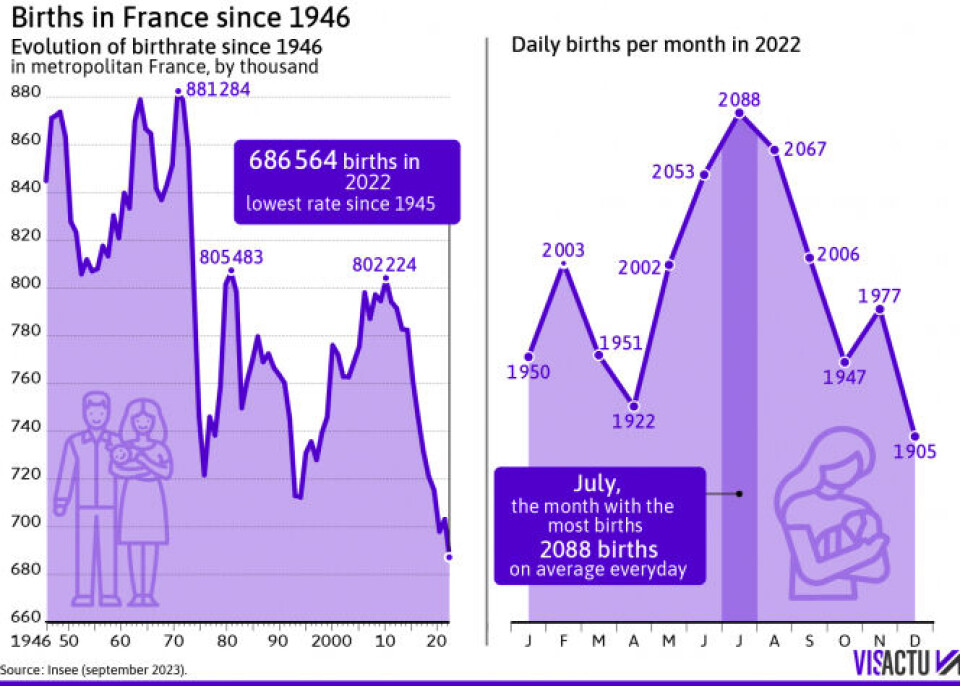-
Dordogne and Corrèze on alert for flooding on Easter Sunday and Monday
Persistent rain and thunderstorms have caused rivers to swell
-
Roadside noise cameras await approval to start issuing fines for loud vehicles in France
The devices known as meduses already exist in several cities but so far have only been ‘instructional’
-
White storks make strong return in France via nest ‘platforms’ and clipped wings
The Ligue pour la Protection des Oiseaux shares the conservation challenges in saving these birds from extinction
Why is there a historic low in babies being born in France?
The number has dropped to a level not seen since World War Two

The number of babies being born in France has dropped to a level not seen since World War Two, new figures show.
Financial concerns are suggested to be a major reason.
There were 1,896 babies born on average every day in August 2023. This is an 8% drop compared to August 2022, figures from national statistics bureau Insee published this week show.
So far this year, there have been around 35,000 fewer births in 2023 than in 2022, “a drop of 7%” year-on-year, Insee stated.
“If this trend continues, the number of births may not exceed the 700,000 mark in 2023, a symbolic threshold,” said Chloé Tavan, head of the demographic surveys and studies division at Insee.
It comes after a 2.2% fall in 2022 (726,000 babies born) compared to 2021.
‘Lowest level since World War Two’
Laurent Chalard, geographer at the European Centre for International Affairs (ECIA), told Le Figaro that “this looks set to be the worst year since 1945”.
Insee confirmed that the number of births is at the lowest level since World War Two, in a downwards trend that began in 2011.
It said that compared to the “peak of births after the war [World War Two], in 1971, births have dropped by 20.8%”. Since 2010, when France was experiencing its own mini baby boom, the drop is 12.8%.

Graphic: Léon Xu / ConnexionFrance.com / Insee
Falling fertility and older mothers
Insee said that the drop is also due to a “fall in fertility” (women having babies), rather than a drop in the number of women of childbearing age per se, as the latter is “fairly stable”, it said.
In 2022, the number of children being born per woman was 1.80, which could fall further by the end of 2023. In 2013 - 10 years ago - the number was almost two children per woman. The number needs to be at two or more to hit the ‘generation replacement threshold’ and stop the birth rate from falling.
In 2022, women aged 25 to 34 had fewer babies. Last year, mothers were on average 31.2 years old when they gave birth, compared to age 30 in 2012, and 26 in the mid-1970s.
Ms Tavan, at Insee, said that the trends could continue, depending on many other factors.
“Having a baby is a long-term decision,” she said. “[Whether the trend will change] depends on how we see ourselves in the future: employment, financial security, housing, the climate... not to mention the more intimate factors.”
Mr Chalard, from the ECIA, said that the decline could be “explained by a combination of factors”, citing high inflation and the war in Ukraine as destabilising elements which may have had an effect.
Childcare, financial difficulties and the environment
In July, the Associations familiales Catholiques (AFC) commissioned a survey in a bid to understand the trend.
“We wanted to understand what was holding the birth rate back, against a backdrop of falling numbers of large families, an increase in the number of childless couples, and the stability in the number of families with one or two children,” said Pascale Morinière, AFC president, to Le Figaro.
The study found that more than a third (38%) of adults under 50 had given up having a child or having another one, if they were already parents.
-
47% said this was due to a problems with childcare (the cost, or a lack of availability)
-
44% said it was due to financial or employment difficulties.
Environmental concerns were also cited - known as the ‘Gink’ movement (‘Green Inclination, No Kids’) - but only behind financial concerns, medical problems, and disagreement with a spouse over the issue.
Green concerns have “probably been overestimated”, said Ms Morinière. “This is mainly [a trend among] young people who are not ready to have children yet anyway.”
However, 39% of those questioned in the poll cited “another reason” for their choice, including the fact that they were single or did not have a partner they wished to have children with.
Parental leave
Nearly half of those surveyed (48%) who have given up on having a child said that more generous parental leave policies could have changed their decision.
Between 2014 and 2021, the number of parents taking parental leave halved.
Ms Morinière said that “this element of family policy was destroyed under François Hollande”, and she argued that “we need to increase the current compensation of €428 per month, which excludes the middle classes from this leave”.
It comes after the new Minister for Solidarity, Aurore Bergé, advocated for better-paid parental leave, even if this would mean less time away.
The poll found that 42% were in favour of parental leave lasting six months to a year, while 34% said they felt it should be for up to two years. The average monthly payment should be €1,141, respondents said.
Other trends
The Insee studies also showed a number of other trends, including:
-
In 2022, almost two-thirds of births (65%) took place outside marriage, compared with 50% ten years earlier.
-
Children are given their father's name less often. 79% of babies bear their father's name, compared with 83% in 2012.
Related articles
Fertility crisis? France’s birth rate hits near 30-year low
France could lose EU top spot as birth rates decline
Babies, life expectancy: how Covid has affected France’s population
























